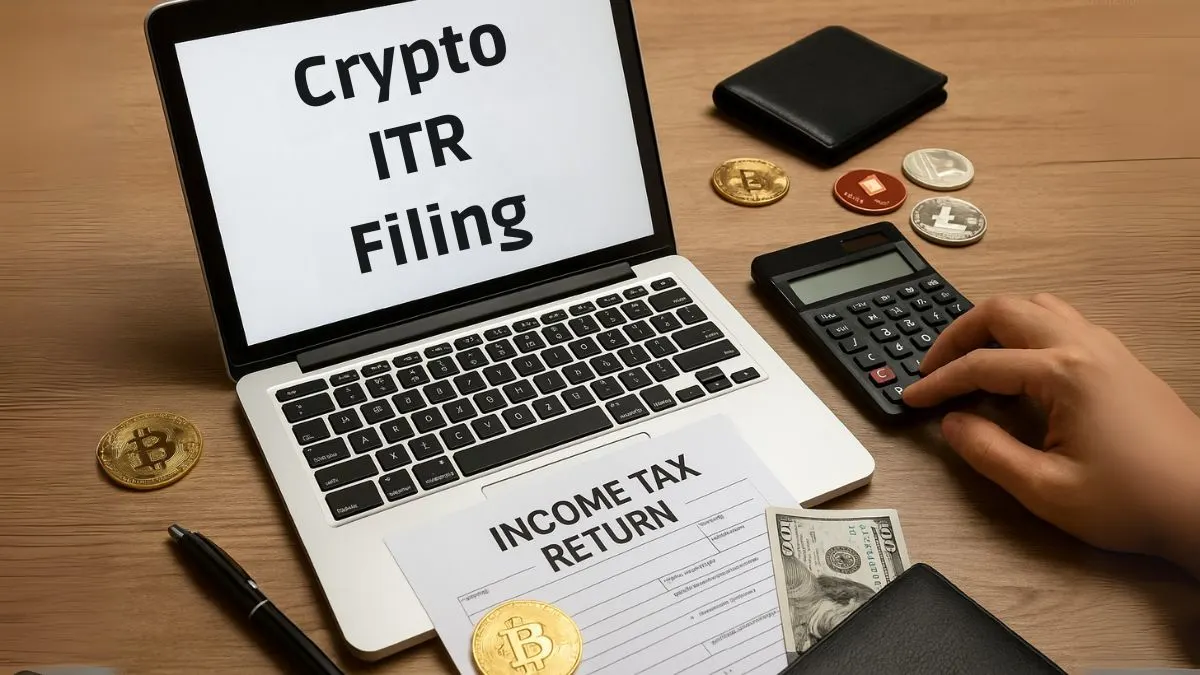
If you’ve made profits by trading on Binance, CoinDCX, or WazirX, it’s time to face the other side of the coin—crypto taxation in India.
Starting FY 2022–23, the Indian government introduced strict tax provisions for Virtual Digital Assets (VDAs), including cryptocurrencies, NFTs, and meme tokens. Whether you’re a casual investor or a full-time trader, filing the correct Income Tax Return (ITR) form and reporting your transactions accurately is now mandatory.
In this blog, we’ll guide you step-by-step on:
- How to calculate crypto tax in India
- Which ITR form to choose for crypto
- What is Schedule VDA, and how to fill it
- Penalties if you don’t comply
What is VDA?
As per Section 2(47A) of the Income Tax Act, Virtual Digital Assets (VDA) include cryptocurrencies, NFTs, and other blockchain-based tokens. All transactions in these assets—whether buying, selling, trading, or even receiving them as a gift—fall under specific tax rules.
How Crypto is Taxed in India
If you’ve sold crypto for INR, traded one coin for another (like BTC to ETH), or used crypto to buy something, you are liable to pay a flat 30% tax on gains. This rate is applicable regardless of your income slab, and no deductions or exemptions are allowed except for the cost of acquisition.
In addition to this:
- 1% TDS applies to all transactions above ₹10,000 (₹50,000 in some cases).
- You cannot set off crypto losses against any other income.
- No carry forward of crypto losses is allowed either.
Which ITR Form is Applicable for Crypto Traders?
If you’ve earned any income from crypto, you cannot use ITR-1 or ITR-4.
Here’s how to choose the correct form:
- ITR-2: Use this if you are an individual or HUF that has no business income. For example, you earned crypto through airdrop, staking, or as gifts, or you occasionally trade.
- ITR-3: If crypto trading is your main source of income or you earn from freelancing, DeFi, or accept crypto as professional/business income, use ITR-3.
New Reporting Requirement: Schedule VDA
The ITR forms for AY 2025–26 include a new section called Schedule VDA, which must be filled out by anyone dealing in VDAs. You need to report:
- Name of the crypto/NFT
- Date of purchase and sale
- Cost of acquisition
- Sale value
- Net gains/losses
Omitting this section can result in ITR notices, fines, and delayed processing.
Also Read: Claim What’s Yours: Child Education Allowance Exemption Most Parents Forget!
Crypto Tax Calculation: How to Do It
Here’s how to calculate your crypto profits:
- Capital Gains = Sale Price – Cost of Acquisition
- If you're trading one crypto for another (like BTC to ETH), use Fair Market Value (FMV) on the trade date.
- Use FIFO or Average Cost method for calculating gains—but be consistent throughout.
And don’t forget—on top of 30% tax, you also pay surcharge 4% health & education cess.
When is Crypto Not Taxed?
Not every crypto activity is taxed:
- Simply holding crypto? → No tax until sold or spent
- Transferring crypto between your wallets? → No tax
- Received crypto as a gift from close family (within ₹50,000)? → Usually exempt
But remember—eventually, when sold or used, tax will apply.
Final Step: Filing the ITR
- Log in to the Income Tax Portal
- Select ITR-2 or ITR-3
- Fill all income sources correctly
- Report crypto details in Schedule VDA
- Submit, verify, and e-verify your return
Also Read: House Property = Tax Liability? Understand Before You File
Conclusion
Filing ITR for crypto in India may seem complex at first, but it’s essential to stay compliant. With growing scrutiny by the Income Tax Department, even minor errors can lead to scrutiny or penalties.
✅ Keep records of all crypto transactions
✅ Select the correct ITR form based on your crypto activity
✅ Fill out Schedule VDA in detail
If you're unsure, it’s always better to consult a CA or tax expert.
💡 Need help with Crypto Tax Filing? Our experts at Callmyca.com can help you prepare accurate reports and file your return without hassle. Book your crypto ITR consultation today.











